AI in Recruitment: Reducing Inequality or Reinforcing It?
AI in recruitment offers potential for fairness but risks reinforcing existing biases. Explore how different platforms address these challenges.
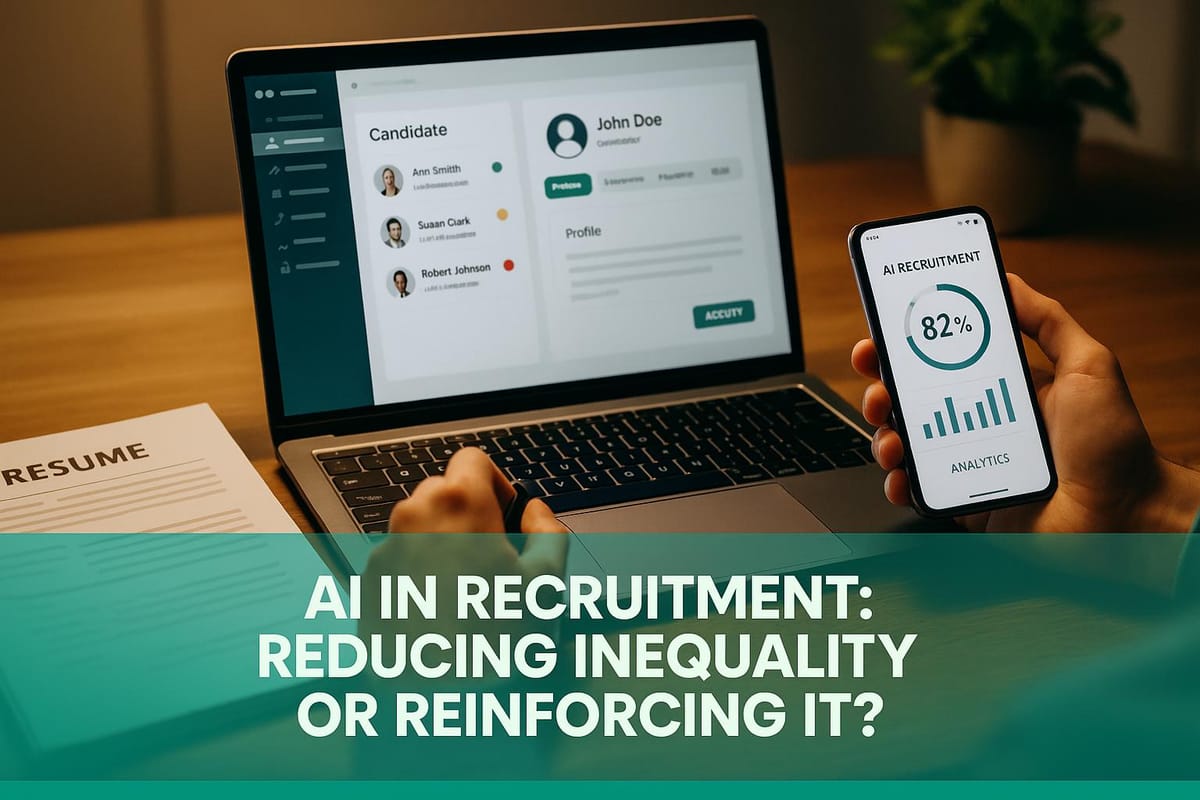
Artificial intelligence is changing how companies hire, offering both opportunities and challenges. While AI can potentially minimize biases by focusing purely on skills, it often replicates inequalities embedded in historical hiring data. This has raised concerns about whether AI-driven recruitment truly levels the playing field or makes it harder for underrepresented groups to compete.
Key Takeaways:
- Bias Risks: AI systems trained on non-diverse data can unintentionally exclude candidates.
- Potential Benefits: AI tools that anonymize applications or focus on skills can reduce human prejudice.
- Platform Differences: Recruitment platforms vary widely in their approach to bias and transparency.
Among the platforms reviewed, scale.jobs stands out for combining AI tools with human oversight, offering transparency through real-time updates and proof-of-work documentation, and addressing bias proactively. Other platforms like Find My Profession, LazyApply, Simplify.jobs, and Jobscan rely more on automation, with varying levels of effectiveness in ensuring equitable hiring.
The balance between automation and human review is key to creating hiring processes that are efficient without perpetuating existing inequalities.
Bias in AI Recruitment Tools: Perpetuating Inequality
1. scale.jobs
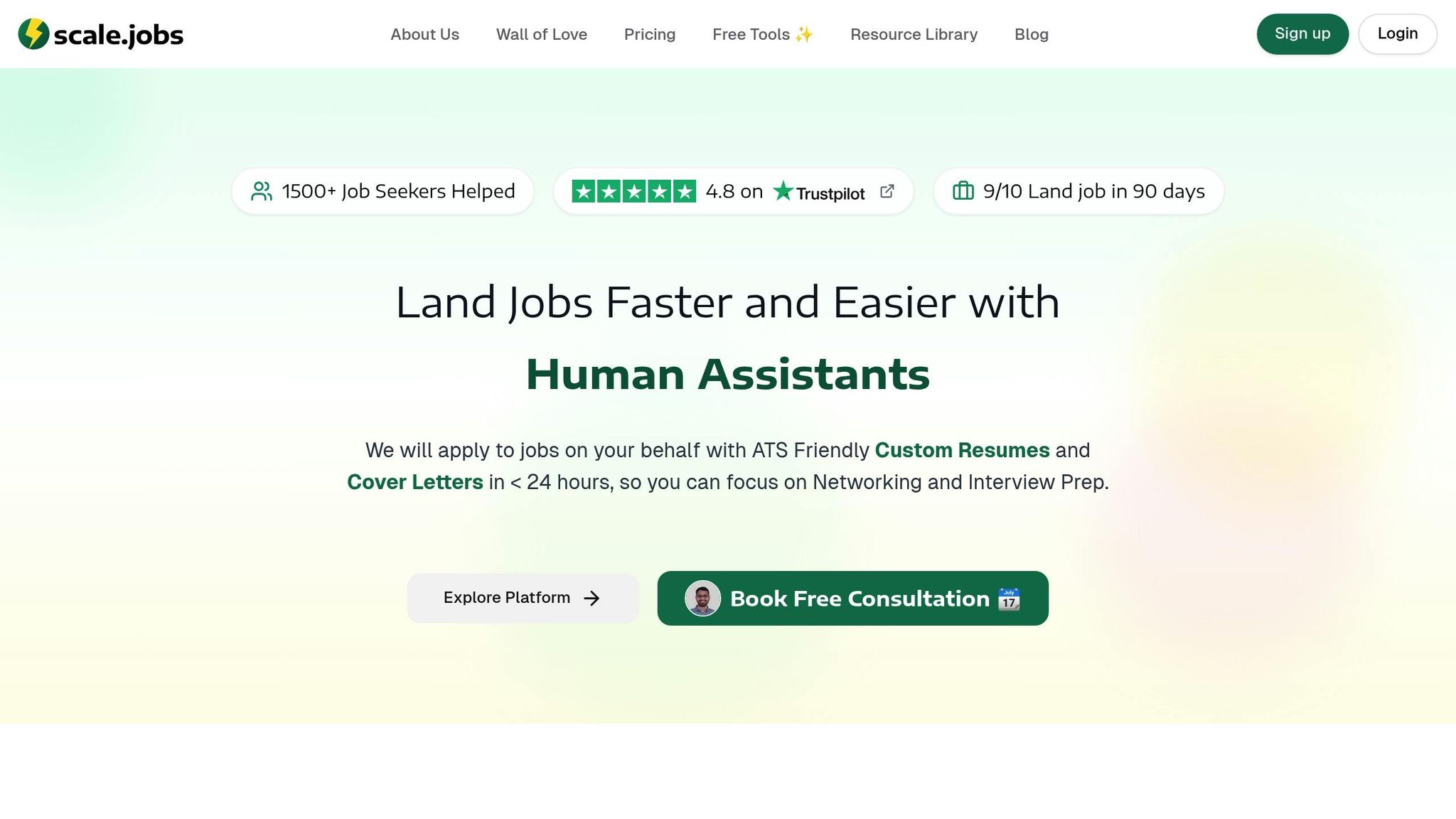
Scale.jobs takes a hybrid approach to hiring, blending AI technology with human oversight. According to industry research, this method can lead to hiring outcomes that are 45% more equitable than traditional human-led processes. Instead of relying solely on algorithms, scale.jobs uses a three-layered service model designed to reduce bias and improve accessibility. This structure reflects the platform’s commitment to creating a fairer hiring process.
AI Bias Mitigation
Scale.jobs employs AI tools like ATS-optimized resume builders and customized resume generators to standardize candidate evaluations and reduce subjectivity. By using diverse training datasets and running regular fairness tests, the platform works to avoid the common "bias in, bias out" problem. For example, the AI Assistant Pro tool - available for $9/month - offers unlimited tailored resumes and cover letters, ensuring that formatting inconsistencies or keyword gaps don’t unfairly disadvantage candidates. These efforts aim to level the playing field for all job seekers.
That said, scale.jobs acknowledges that AI isn’t a perfect solution for eliminating bias. Its effectiveness depends heavily on the quality of the training data and ongoing audits to ensure fairness - areas that require constant attention.
Human Involvement
What sets scale.jobs apart is its inclusion of Human Assistant services, where trained recruiters oversee applications. This human element acts as a safeguard against potential AI errors, ensuring that no hiring decision is made without accountability. The combination of automation and human review addresses concerns about AI unintentionally reinforcing biases.
Human assistants manage applications across various platforms, from corporate ATS systems to niche job boards. This service is particularly helpful for candidates like immigrants dealing with complex visa situations (e.g., H1B, F1, CPT, TN, O1, EB1A), who often face additional challenges during automated screening processes. By integrating human oversight, scale.jobs enhances fairness and accountability, catching potential issues that algorithms might overlook.
Transparency and Proof of Work
Scale.jobs prioritizes transparency by offering real-time WhatsApp updates, time-stamped proof-of-work screenshots, and refunds for unused credits. These features allow candidates to track their progress and verify the work being done on their behalf.
In an era where AI systems are under increasing scrutiny, this level of openness builds trust. Proof-of-work documentation reassures job seekers, especially those who have faced bias in previous hiring experiences, that their applications are being handled with care and accountability.
Pricing Structure
The platform’s pricing model is designed to remove financial barriers that could disadvantage job seekers. Essential tools like the Resume ATS Checker, Cover Letter Generator, Job Applications Tracker, and Interview Questions Predictor are completely free. For Human Assistant services, scale.jobs uses a flat-fee system, ranging from $199 for 250 applications to $1,099 for the Ultimate Bundle, which includes 1,000 applications and dedicated recruiter support. This straightforward pricing avoids the pitfalls of recurring subscriptions, which can strain job seekers during prolonged job searches.
Candidate Support
Beyond its accessible pricing, scale.jobs provides a wide range of tools and services to support job seekers. From recent graduates to immigrants navigating visa challenges, the platform addresses the diverse needs of its users. Features like salary predictors, portfolio website generators, and ATS feedback engines equip candidates with the resources they need to compete effectively in today’s job market.
2. Find My Profession
Find My Profession stands out for prioritizing a personal, human-first approach to recruitment services. However, when it comes to documentation and transparency, there are some noticeable gaps.
For instance, there’s no clear confirmation that clients receive detailed, time-stamped records of job applications or follow-up activities. Unlike platforms like scale.jobs - which offers real-time updates via WhatsApp and proof-of-work logs - Find My Profession doesn’t provide the same level of transparency. This lack of real-time tracking and documentation could leave some users questioning the accountability of their services.
Before committing, it’s worth reaching out to clarify how Find My Profession handles these aspects, especially if consistent updates and detailed records are important to you.
3. LazyApply
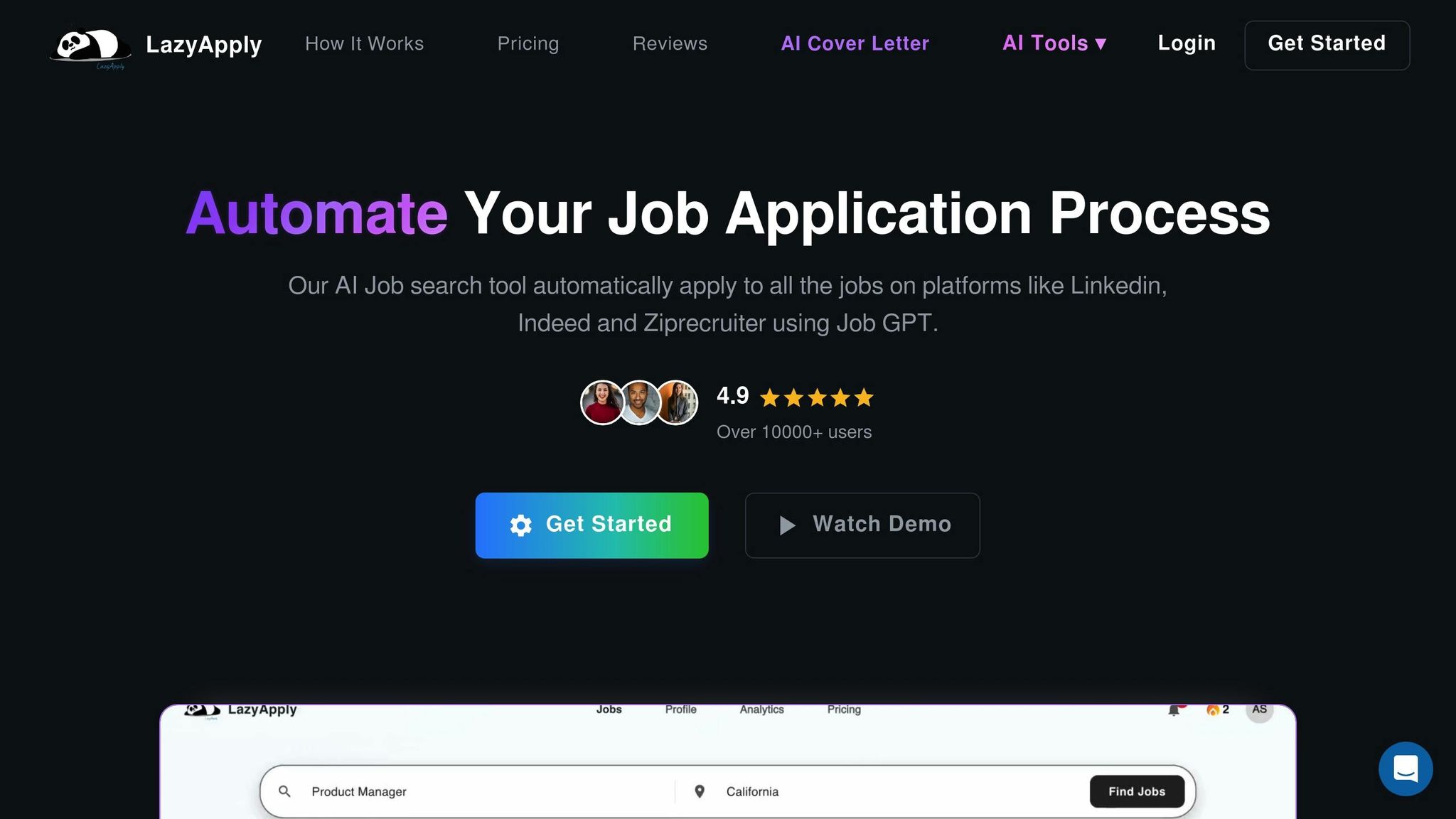
LazyApply takes a very different route compared to platforms like scale.jobs and Find My Profession. Instead of focusing on relevance or quality, LazyApply emphasizes sheer volume, submitting large numbers of applications with minimal filtering. This "quantity over quality" approach can lead to a significant number of irrelevant submissions, making it less targeted than other services.
AI Bias Mitigation
One major drawback is that LazyApply does not verify job listings. This means the platform might send applications to outdated or even fake job postings. By prioritizing volume without verifying the accuracy of listings, users may find themselves applying to jobs that are no longer valid or suitable, which can hurt their chances of landing meaningful opportunities.
Human Involvement
LazyApply also operates with minimal human oversight. This lack of personalized guidance makes it difficult for users to tailor their applications to specific job roles or requirements. Without the ability to customize, the applications sent may feel generic, potentially reducing their effectiveness in catching a recruiter’s attention.
Transparency and Proof of Work
LazyApply advertises features like "application analytics to track daily progress" and "job search tracking across platforms." However, the platform provides little detail about how these analytics work or how much customization is possible. Users don’t receive comprehensive records of their application submissions, which raises questions about transparency. Adding to this concern, LazyApply recently rebranded its Trustpilot page to "PEVE VISIONS", which could make some users skeptical about its accountability.
4. Simplify.jobs
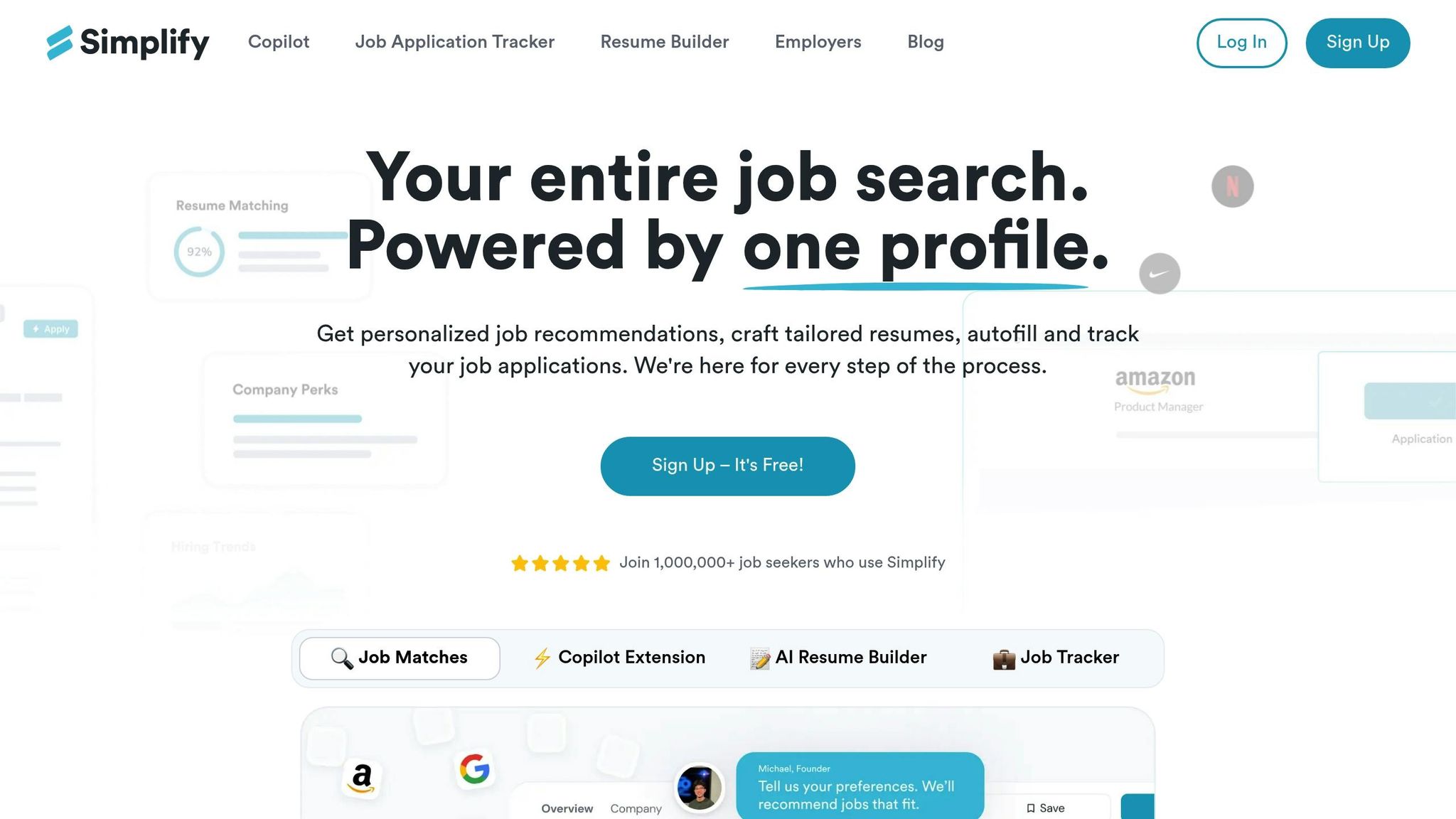
Simplify.jobs uses automation and tracking tools to make job applications easier but falls short when it comes to addressing issues like AI bias or recruitment inequality. Here's how it stacks up against scale.jobs, which offers a more comprehensive set of features.
AI Bias Mitigation
Simplify.jobs does not provide any clear information about how it tackles AI bias. This lack of transparency leaves job seekers in the dark about how their data is being used or how automated processes might impact their chances.
Human Involvement
The platform seems heavily reliant on automation, with little evidence of human oversight in the application process. On the other hand, scale.jobs takes a more hands-on approach by involving trained professionals who review and customize applications, offering a personal touch that can make a big difference in competitive job markets.
Transparency and Proof of Work
Another drawback of Simplify.jobs is its lack of detailed tracking features. Unlike scale.jobs, which provides time-stamped proof-of-work screenshots and real-time updates via WhatsApp, Simplify.jobs doesn't offer similar transparency into the application process.
Pricing Structure
Simplify.jobs doesn't clearly outline its pricing, making it harder for users to understand the cost of its services. In contrast, scale.jobs is upfront about its pricing, offering both a free tier and affordable premium options.
Why scale.jobs Comes Out Ahead
- Personalized Support: scale.jobs employs trained experts to refine and tailor job applications, a feature absent in Simplify.jobs' automation-only system.
- Clear Transparency: Real-time updates and proof-of-work screenshots from scale.jobs provide users with better insight into their application progress.
- ATS-Friendly Documents: Resumes and cover letters crafted by scale.jobs are optimized for Applicant Tracking Systems, increasing the likelihood of catching an employer's attention.
- Budget-Friendly Options: With a free tier and reasonably priced premium plans, scale.jobs offers flexibility for job seekers at all levels.
In short, while Simplify.jobs focuses on automation, scale.jobs goes the extra mile with human involvement, transparency, and user-friendly pricing.
5. Jobscan
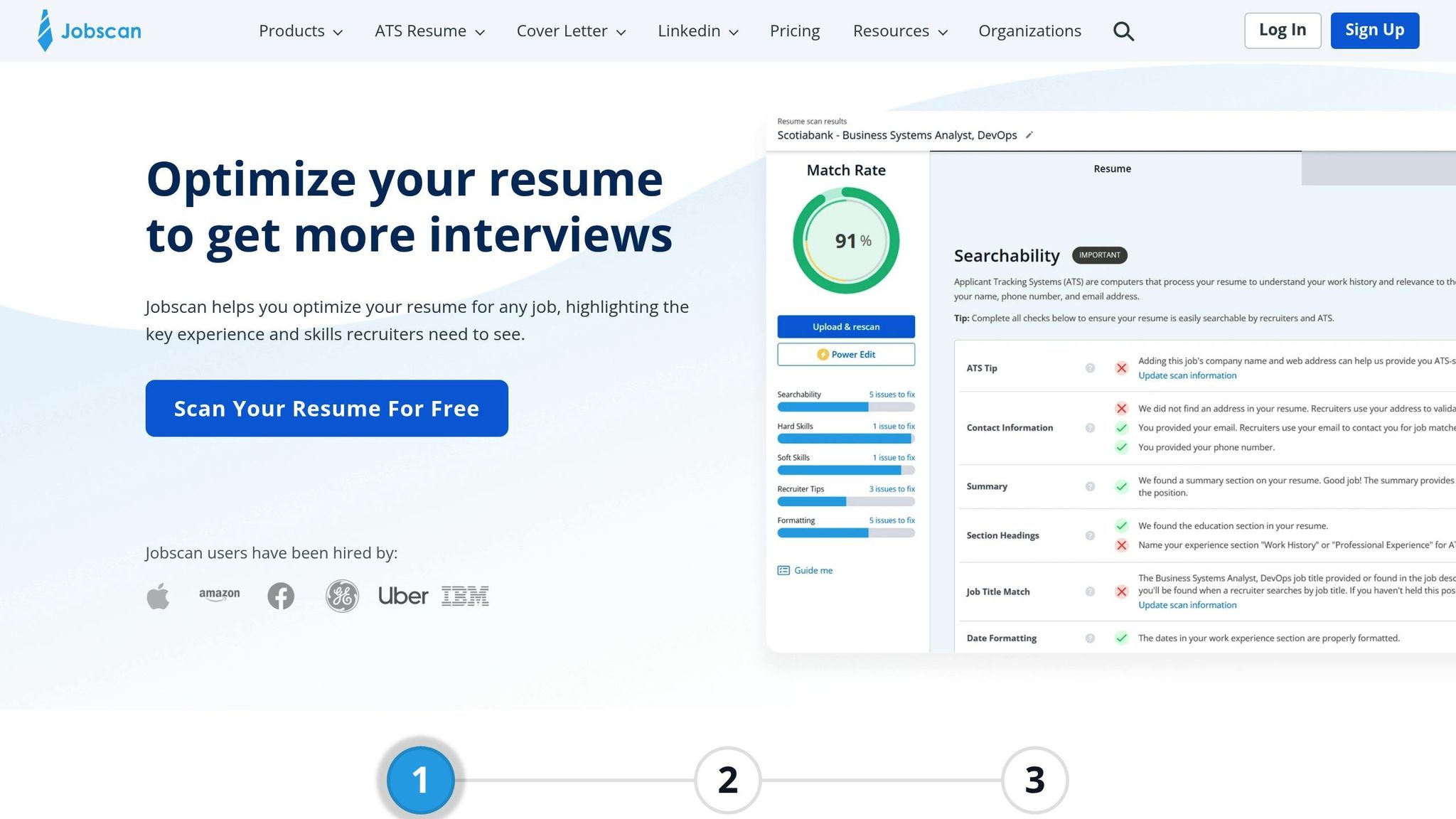
Jobscan is marketed as a tool to help job seekers optimize their resumes for Applicant Tracking Systems (ATS). However, when compared to scale.jobs' combination of AI technology and human oversight, it leaves some important gaps unaddressed.
AI Bias Mitigation
Jobscan's primary focus is on keyword matching and ensuring ATS compatibility. While this can improve match rates by tailoring resumes to job descriptions, it doesn't tackle the bigger issue of bias in recruitment algorithms. Without addressing how AI systems may unintentionally discriminate against certain demographics, users might unknowingly tailor their resumes to work within a flawed system.
On the other hand, scale.jobs integrates AI tools with human review to identify and address potential bias before applications are submitted. This combined approach highlights a key difference between Jobscan's automated focus and scale.jobs' commitment to fairness and representation.
Human Involvement
Jobscan operates entirely through automation. Users receive recommendations based solely on algorithms, with no input from experts who can interpret or refine the suggestions.
In contrast, scale.jobs employs trained virtual assistants who are well-versed in ATS standards and the subtleties of fair representation. These experts ensure that automated suggestions don’t unintentionally downplay a candidate's strengths or misrepresent their qualifications. This human involvement adds a layer of accountability that Jobscan lacks.
Transparency and Proof of Work
Jobscan provides users with general match scores and feedback but doesn’t disclose how those scores are calculated. This lack of clarity can leave users in the dark about why certain changes are recommended.
scale.jobs stands out with its transparent process. Candidates receive detailed documentation and real-time updates, including time-stamped screenshots, showing exactly what actions were taken and why. This level of transparency helps users trust the process and understand the reasoning behind each decision.
Pricing Structure
Jobscan operates on a subscription basis, starting at $49.95 per month for basic features and going up to $99.95 for premium plans. For job seekers on a budget, these recurring costs can add up quickly.
scale.jobs, however, offers a flat-fee pricing model with no ongoing subscriptions. During its launch period, the AI Assistant Pro starts at just $9 per month, making it a far more affordable option. Additionally, unused credits are refundable, further reducing financial risk.
Why scale.jobs Stands Out
- Human-AI Collaboration: While Jobscan relies solely on automation, scale.jobs combines AI tools with human expertise to address bias and ensure fair representation.
- Comprehensive Service: Unlike Jobscan, which focuses only on resume optimization, scale.jobs manages the entire application process, including cover letters, job submissions, and follow-ups.
- Affordable Pricing: With its flat-fee model and low launch pricing, scale.jobs is a more budget-friendly choice compared to Jobscan's costly subscriptions.
- Proven Accountability: Time-stamped updates and documentation provide clear proof of work, a level of transparency Jobscan doesn’t offer.
- Bias-Aware Processes: Human reviewers at scale.jobs actively work to identify and mitigate potential bias, an issue that Jobscan’s automated system overlooks.
While Jobscan can assist with basic ATS compatibility, it falls short in addressing the larger challenges of fairness and transparency in AI-driven recruitment. scale.jobs bridges these gaps with its human-centered approach, making it a more equitable and effective solution for job seekers.
Platform Strengths and Weaknesses
When evaluating job platforms, it's important to consider factors like human oversight, transparency, pricing, and candidate support. Here's a breakdown of how some popular platforms compare:
| Platform | Human Oversight | Transparency | Pricing Model | Candidate Support |
|---|---|---|---|---|
| scale.jobs | Strong human oversight | Real-time WhatsApp updates and time-stamped proof-of-work screenshots | Flat-fee for human-assisted services, plus an AI Assistant Pro option ($9/month launch offer) | 24/7 support, including visa assistance and comprehensive job search management |
| Find My Profession | Offers professional resume writing; limited details on application management | Limited transparency on processes | Premium pricing, but costs are not widely disclosed | Primarily focuses on resume services with unclear broader support |
| LazyApply | Primarily automated application submissions with minimal human involvement | Limited tracking and reporting details | Subscription-based pricing; exact figures are unclear | Does not emphasize human-guided support |
| Simplify.jobs | Relies on algorithm-driven matching without human review | Basic tracking features; transparency details are limited | Freemium model with variable paid tiers | Limited ongoing candidate support beyond initial applications |
| Jobscan | Focuses on algorithm-based recommendations without human review | Internal scoring methodologies lack full transparency | Subscription model with limited pricing details | Emphasizes ATS optimization; lacks extended application guidance |
This table highlights the strengths and gaps of each platform, offering insights into how they approach job application management.
A Closer Look at scale.jobs
Among these platforms, scale.jobs stands out for its commitment to transparency and human oversight. By combining trained human assistants with tools like real-time updates and proof-of-work screenshots, it provides a level of accountability that many job seekers find reassuring. This hands-on approach is particularly valuable for candidates who want clear, reliable support throughout their job search.
Automation vs. Human Support
In contrast, many other platforms lean heavily on automation or limit their services to specific areas like resume writing or algorithm-based matching. These approaches often lack the transparency and personalized support that candidates may need to navigate the complexities of the job market. Without clear details on their processes or comprehensive support, it can be difficult for users to fully understand what they're signing up for.
Balancing Automation and Accountability
The challenge for job platforms lies in finding the right balance between automation and accountability. Platforms like scale.jobs aim to address this by integrating human oversight into their services, helping to mitigate potential biases and ensure fairness. The flat-fee pricing and affordable AI service also make it an attractive option for budget-conscious candidates or those facing additional hurdles, such as visa requirements.
For job seekers who value transparency, personalized guidance, and predictable pricing, scale.jobs sets itself apart from competitors that rely solely on automation or lack clear support structures. Its thoughtful approach to candidate needs makes it a strong choice in a crowded field.
Final Verdict
Reducing inequality in recruitment while maintaining effective hiring tools is no small feat, and the platforms we've reviewed take very different paths to tackle this challenge. The standout factors? Human oversight and transparency. These two elements are crucial in determining whether AI-powered recruitment tools genuinely help diverse candidates - or unintentionally create more barriers.
Among the platforms, scale.jobs shines the brightest when it comes to fairness and bias prevention. By blending trained human assistants with real-time WhatsApp updates and time-stamped proof-of-work screenshots, it offers a level of accountability that fully automated platforms simply can't match. This "human-in-the-loop" approach ensures potential biases are caught early, safeguarding candidates' chances. Plus, their flat-fee pricing model removes financial hurdles that often keep underrepresented candidates from accessing premium job search tools.
On the other hand, Find My Profession focuses on professional resume writing but falls short in application management and transparency. Without clear insight into their processes, candidates - especially those from marginalized groups - are left uncertain about how fairly their applications are being handled.
Jobscan, while helpful for optimizing resumes for Applicant Tracking Systems (ATS), doesn't address the broader issues of inequality in recruitment. Its focus is narrow, offering little in terms of comprehensive support for diverse job seekers.
The biggest red flags come from LazyApply and Simplify.jobs. Their fully automated, algorithm-driven systems lack the human review needed to spot and correct biases. With no transparency in their matching or application processes, these platforms risk reinforcing the very disparities they should be working to dismantle.
For job seekers aiming to reduce bias while boosting their chances, scale.jobs offers the best solution. At just $9/month with their AI Assistant Pro launch offer, it combines affordability with advanced features. More importantly, its human-assisted services ensure that real people - not just algorithms - are advocating for your success.
The takeaway is clear: platforms that integrate AI efficiency with human oversight and transparent practices are the most effective at promoting fairness in hiring. Those relying solely on automation without accountability risk deepening existing inequalities, making it harder for underrepresented candidates to compete. This analysis underscores the importance of blending human judgment with AI technology for a recruitment process that’s fairer for everyone.
FAQs
Can AI in recruitment unintentionally reinforce biases in hiring?
Yes, AI in recruitment has the potential to unintentionally reinforce biases, largely due to the way it learns from historical data or the flaws in algorithm design. Since these systems rely on past hiring trends, they can inadvertently replicate and even magnify the biases present in earlier decisions. This can lead to unfair treatment of candidates based on factors like race, gender, or other personal characteristics.
For instance, if past hiring data shows a preference for specific demographics, the AI might lean toward similar profiles, sidelining equally qualified candidates from underrepresented groups. Without careful monitoring and regular checks, these biases can linger, making it harder to achieve a fair and inclusive hiring process. To address this, companies need to prioritize using diverse and balanced training data and adopt transparent, ethical practices when implementing AI tools.
How does scale.jobs promote fairness and transparency in recruitment?
Scale.jobs puts fairness and transparency at the heart of its hiring process by merging cutting-edge technology with personalized human support. Pay transparency, open communication with candidates, and straightforward recruitment practices are key pillars of its approach.
The platform offers features like ATS-optimized documents, proof-of-work updates, and dedicated WhatsApp support to deliver a smooth and equitable experience. By combining the strengths of human expertise with AI, Scale.jobs sets itself apart from AI-only tools and traditional agencies, creating a more inclusive and transparent way to hire.
Why is human involvement essential in AI-powered recruitment, and how does it help job seekers?
Human participation in AI-powered recruitment processes plays a crucial role in promoting fairness and minimizing biases that AI systems might unintentionally amplify. While AI excels at analyzing vast amounts of data quickly, it can miss important aspects like a candidate's soft skills, cultural fit, or unique experiences that don’t align with rigid patterns.
When humans step in to oversee these systems, job seekers gain the advantage of more thoughtful and ethical evaluations. This human touch introduces accountability and transparency, reassuring candidates that their applications are being reviewed with care and fairness. By blending AI with human judgment, the hiring process becomes more inclusive, addressing workplace disparities and ensuring every applicant has a fair shot.




